The Batchelor Collection - About Us
Alan
Alan Batchelor was born in East London in 1927, he was the fourth child of the family and was educated at Highbury County School in Islington.
At the age of 18 he was called up for duty in the Second World War and under the Ernest Bevin scheme to keep the coal mines operational while the real miners were fighting in the forces Alan was conscripted to the coal mines - he was a Bevin Boy. It was not a matter of choice or the easy option: Bevin Boys had no choice, if your name and number were picked that was it. Alan trained and worked in the Derbyshire coalfields but was invalided out after a fall at the coal face and he was buried.
On return, after a period of convalescence he went into the printing trade working for a variety of local printers. He had an interest in photography and his father had bought him his first camera while he was recuperating.
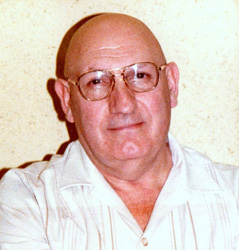
Alan
Alan became a very keen amateur Photographer with his own darkroom. He took photographs of many subjects including local scenes, church architecture and weddings. This brought him in a nice little bit of extra income. He kept up to date with all the new, up and coming techniques, and advanced his knowledge and skills. And was a pioneer of home processed colour printing, working completely in the dark, and dish processing test strip upon test strip to get the colour balance and exposure right. He made copious notes and referred to them over and over again.
In the 1970’s his boss, who knew of Alan’s skill and photographic knowledge gave him a blank cheque to build the firm a litho-photographic darkroom and studio. This was something he very much enjoyed and which led him to becoming head of the photographic unit until he retired in 1992.
Alan and Joyce Met in late 1940’s and married in 1951.
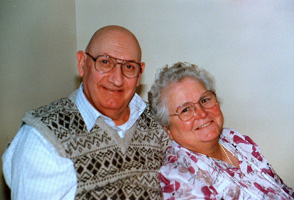
Alan and Joyce
Joyce
Through their mutual interest of photography Joyce and Alan became members of the Hackney Photographic Society (HPS); where they had to change the constitution in order for Joyce to join, as ladies weren’t allowed to be members! This was a month after Ruth was born in September 1953, and was originally designed as a night out for Joyce - and a break from the baby!
However the interest grew and Joyce became the secretary of the HPS and was then elected to serve on the Executive committee for the Central Association of Photographic Societies (CAPS), which governed all the Affiliated Photographic Clubs in Southern England.
She held many positions within the CAPS, Secretary, Exhibition Secretary, and Bulletin Editor etc. Her Organisational and Administrative skills were second to none. She organised many lectures, conferences and seminars at such prestigious venues as London University and The Royal Society of Arts. Alan was also involved in these seminars, lectures, usually as one of the lecturers or experts leading the way.
Joyce worked very hard for both organisations the HPS and CAPS. And over time became President of the HPS. During this time she was also elected onto the governing body for photographic clubs and societies - The Photographic Alliance of Great Britain, (PAGB) where once again she served on the committee. She was also elected Vice President of the CAPS and subsequently President - this was an exceptional honour as she was the very first Lady President of this prestigious organisation.
Apart from her organisational skills Joyce was in her own right a very talented photographer and won many awards both nationally and internationally.
Joyce was eventually awarded the title of Award of the Photographic Alliance of Great Britain for Meritorious Service. which entitles her to bear the letters APAGB after her name.
Since moving to Norfolk, Joyce was also heavily involved with The North Norfolk Camera Club, until about 10 years ago when her health problems forced her to resign.

Joyce
Ruth
Some friends' earliest memories of Ruth was of her having her nappy changed on a camera club outing, not something she would want broadcast, but it goes to show just how long and how much photography has influenced her life.
Her first accolade was when she was 4 years old and took a photograph of a sunset through the window of a train whilst returning from a camera club outing; it was entered into a British Rail Competition and came 3rd. This was an adult competition.
At 6 years old she already had her first twin lens reflex camera. One summer Saturday when Joyce and Alan had two weddings to photograph, one was a paying customer the other a family friend. Joyce was detailed to take the family friends wedding photos, and did so, but unbeknown to her the mirror in her camera had jammed upwards giving a distorted image so the photos were useless (a wedding photographer's worst nightmare) - what to do?
A very perplexed Alan began to process Ruth’s film, who had stood beside Mummy and like Mummy had taken every shot exactly the same. All Ruth’s shots were perfect - she saved the day and Ruth’s photos were used as the official wedding photographs - the only give away was the slightly lower view point! She takes great delight in telling people that she took her first wedding photographs aged 6 years old!
Ruth has taken many weddings over the years, but is always a nervous wreck in case something should go wrong, she carries 3 cameras and duplicates as she goes, not leaving anything to chance! She did her last wedding 4 years ago, saying that was ‘it’ - it’s too much responsibility!
Ruth’s employment roots were in Child Care and she worked for the Social Services Department for a busy multicultural London Borough for 23 years. She worked as a residential social worker, trained at Birmingham Polytechnic and qualified in 1975 with the Certificate in Residential Care of Children and Young People (CRCCYP).
Children in care have many problems and needs, and Ruth worked in a variety of homes coping with disturbed and violent youngsters, as well as younger more vulnerable and abused children. She also ran a unit for teenagers with mental and physical handicaps, teaching them basic life skills to enable them to live as normal a life as possible.
Ruth used her skill as a photographer within her role at work, using pictures of the children for their life storybooks and for the house photo albums. She also created a "Foto Food" cook book. Photographing several recipes, its ingredients, and utensils needed at each stage of the cooking process from start to finish! The Foto Food book was used with the youngsters in the Unit who could not read; but by looking at the pictures, the teenagers could find what they needed and follow what to do for fairly complicated favourite recipes.

Ruth
Ruth took voluntary redundancy in 1993 after Alan died, so that she could become Joyce’s full time carer.
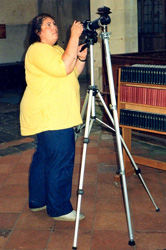

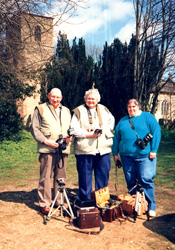
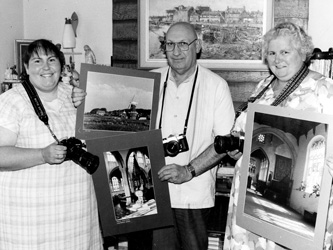
Left to right: Ruth working; The Batchelor family; Outside Stibbard church; Posing for the press.
